By Luciano Pellicani · Thursday, April 4, 2013 Luciano Pellicani ‘s “The Cultural War between Athens and Jerusalem: The American Case” appears in Telos 162 (Spring 2013). Read the full version online at the Telos Online website, or purchase a print copy of the issue in our store.
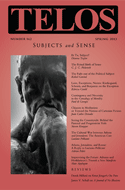 Despite what Harold Berman claimed, the writers of the American Constitution were not inspired by strong religious convictions. On the contrary, as typical men of the Enlightenment they were severe critics of Christianity, considering it an obscurantist and intolerant tradition in all its versions. Hence their cultural battle to achieve the institutionalization of what Thomas Jefferson called “the wall of separation between State and Church” that would guarantee the greatest religious freedom. A freedom that was periodically threatened by fundamentalist movements which, in the name of Jerusalem, sought—and still seek—to establish a confessional state governed by the truth revealed in the Bible whereas the founding fathers hoped that “what Athens was in miniature, America will be in magnitude.” It is not true that America was born modern and progressive, as Ernest Gellner has maintained. It became so through the cultural war between Athens and Jerusalem that began in the eighteenth century and is still in progress. Despite what Harold Berman claimed, the writers of the American Constitution were not inspired by strong religious convictions. On the contrary, as typical men of the Enlightenment they were severe critics of Christianity, considering it an obscurantist and intolerant tradition in all its versions. Hence their cultural battle to achieve the institutionalization of what Thomas Jefferson called “the wall of separation between State and Church” that would guarantee the greatest religious freedom. A freedom that was periodically threatened by fundamentalist movements which, in the name of Jerusalem, sought—and still seek—to establish a confessional state governed by the truth revealed in the Bible whereas the founding fathers hoped that “what Athens was in miniature, America will be in magnitude.” It is not true that America was born modern and progressive, as Ernest Gellner has maintained. It became so through the cultural war between Athens and Jerusalem that began in the eighteenth century and is still in progress.
Continue reading →
By Danilo Breschi · Friday, December 14, 2012 This paper was presented at Telos in Europe: The L’Aquila Conference, held on September 7-9, 2012, in L’Aquila, Italy.
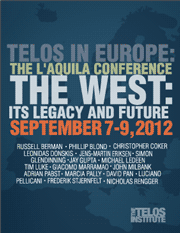 It is with Tocqueville that the term democracy acquires a positive connotation. When the first part of Democracy in America appeared in 1835, the very title came as a surprise. It was radically new, and it struck people like a bolt from the blue. Tocqueville took another unprecedented step when he associated democracy and equality. According to Aristotle, equality is an aspect of justice, not democracy. The equality that Tocqueville had in mind was not political or economic, but social; it referred to a social condition arising from equality of condition and from a pervasive egalitarian ethos. The latter reflected, in turn, the absence of a feudal past in the New World. Back in Europe and France, Tocqueville lived through the events of 1848, when the notion of “revolution” gained a socialist character. It is at such point that Tocqueville perceives a conflict between socialism and liberty: socialism means equality without liberty, while democracy stands for equality and freedom. He thus starts a new debate, that of the problematic relationship between equality and liberty, which draws on his dual political experiences in Europe and America. He discovers that it is through their synthesis that a political system capable of combining the best aspects of liberty and equality might emerge. Liberal democracy could therefore be born of the encounter between Europe and America, that is to say, the two main parts of the Western World. It is with Tocqueville that the term democracy acquires a positive connotation. When the first part of Democracy in America appeared in 1835, the very title came as a surprise. It was radically new, and it struck people like a bolt from the blue. Tocqueville took another unprecedented step when he associated democracy and equality. According to Aristotle, equality is an aspect of justice, not democracy. The equality that Tocqueville had in mind was not political or economic, but social; it referred to a social condition arising from equality of condition and from a pervasive egalitarian ethos. The latter reflected, in turn, the absence of a feudal past in the New World. Back in Europe and France, Tocqueville lived through the events of 1848, when the notion of “revolution” gained a socialist character. It is at such point that Tocqueville perceives a conflict between socialism and liberty: socialism means equality without liberty, while democracy stands for equality and freedom. He thus starts a new debate, that of the problematic relationship between equality and liberty, which draws on his dual political experiences in Europe and America. He discovers that it is through their synthesis that a political system capable of combining the best aspects of liberty and equality might emerge. Liberal democracy could therefore be born of the encounter between Europe and America, that is to say, the two main parts of the Western World.
Continue reading →
By Frederick Wertz · Tuesday, December 11, 2012 As an occasional feature on TELOSscope, we highlight a past Telos article whose critical insights continue to illuminate our thinking and challenge our assumptions. Today, Frederick Wertz looks at Elliot Neaman’s “The New (Old) Discourse on the American Empire and the War in Iraq” from Telos 132 (Fall 2005).
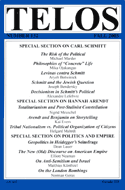 Critiques of American imperialism are easy to find at the domestic and the international level, especially in today’s partisan and reactionary political climate. The contemporary discourse is beginning to focus on the decline of the American empire, despite the fact that there is very little consensus as to whether or not America ever even had an empire to begin with, in any objective historical context. Critiques of American imperialism are easy to find at the domestic and the international level, especially in today’s partisan and reactionary political climate. The contemporary discourse is beginning to focus on the decline of the American empire, despite the fact that there is very little consensus as to whether or not America ever even had an empire to begin with, in any objective historical context.
In an article written in the midst of a heated debate about American imperialism and the War in Iraq, Elliot Neaman takes a step back from the fray and takes a look at the development of the contemporary discourse surrounding the issue. While the debate may or may not have evolved significantly from where it was in 2005, Neaman’s analysis of various critiques of American empire has enduring aspects that pertain far beyond the scope of American foreign policy. By looking at various pro- and anti-empire positions from both the Left and Right, we can draw meaningful lessons about the development of discourse and the interpretation of history.
Continue reading →
By James Fowler · Wednesday, October 26, 2011 As an occasional feature on TELOSscope, we highlight a past Telos article whose critical insights continue to illuminate our thinking and challenge our assumptions. Today, James Folwer looks at Anton Oleinik’s “On Negative Convergence: The Metaphor of Vodka-Cola Reconsidered” from Telos 145 (Winter 2008).
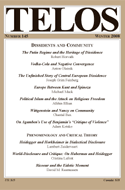 Since the fall of the Iron Curtain in 1990 there has been an accelerated process of negative convergence between the United States and Russia, encompassing transfers of knowledge, technologies, and institutions. The issue that Anton Oleinik tackles in “On Negative Convergence: The Metaphor of Vodka-Cola Reconsidered” is whether or not this process has helped us move toward a better, more inhabitant-friendly world. As Oleinik explains: “Change is bilateral: from the United States as well as to the United States. These transfers do not always contribute to improving the situation at either end of exchange. On the contrary, mechanisms of negative learning and mimicry operate that support a hypothesis of ‘negative convergence’: globalization in its current form produces a convergence of participating countries toward a constellation of common problems instead of moving toward a better world.” Since the fall of the Iron Curtain in 1990 there has been an accelerated process of negative convergence between the United States and Russia, encompassing transfers of knowledge, technologies, and institutions. The issue that Anton Oleinik tackles in “On Negative Convergence: The Metaphor of Vodka-Cola Reconsidered” is whether or not this process has helped us move toward a better, more inhabitant-friendly world. As Oleinik explains: “Change is bilateral: from the United States as well as to the United States. These transfers do not always contribute to improving the situation at either end of exchange. On the contrary, mechanisms of negative learning and mimicry operate that support a hypothesis of ‘negative convergence’: globalization in its current form produces a convergence of participating countries toward a constellation of common problems instead of moving toward a better world.”
Continue reading →
By François Debrix · Tuesday, July 17, 2007 This is the second part of a review of Jean-Claude Paye’s Global War on Liberty, recently published by Telos Press Publishing and available in our store. Part 1 of the review is here, and part 3 is here. The review will soon appear in full in the journal.
Beyond the Suspension of the Law
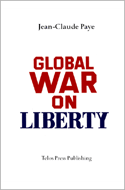 Paye writes that “the rule of law becomes increasingly formal, not only because its content, the protection of private life and the defense of individual and public liberties, turns out to be very limited, but also by the practical possibility offered to the executive power to free itself completely from the last safeguards of legal order” (34). He adds: “The strengthening of the executive relative to the other powers makes possible the general and permanent suspension of the law. It is the instrument for setting up a state of exception” (34). For Paye, the state of legal/constitutional exception implemented in most Western democracies is not about a temporary suspension of the law, one that might guarantee a preservation of existing democratic principles in countries like the United States, Great Britain, France, Belgium, Italy, or the European Union in general (the cases that Paye spends his time detailing in Global War on Liberty). More importantly, it is also more than a suppression of democratic legal and judicial systems, and of the individual rights that these normally guarantee, that would become a new rule of permanence, a new long-lasting condition of suspension of the rule of law, whereby politics could become the product of a succession of ad hoc decisions made by government officials and bureaucrats (as Agamben and others have intimated). Paye writes that “the rule of law becomes increasingly formal, not only because its content, the protection of private life and the defense of individual and public liberties, turns out to be very limited, but also by the practical possibility offered to the executive power to free itself completely from the last safeguards of legal order” (34). He adds: “The strengthening of the executive relative to the other powers makes possible the general and permanent suspension of the law. It is the instrument for setting up a state of exception” (34). For Paye, the state of legal/constitutional exception implemented in most Western democracies is not about a temporary suspension of the law, one that might guarantee a preservation of existing democratic principles in countries like the United States, Great Britain, France, Belgium, Italy, or the European Union in general (the cases that Paye spends his time detailing in Global War on Liberty). More importantly, it is also more than a suppression of democratic legal and judicial systems, and of the individual rights that these normally guarantee, that would become a new rule of permanence, a new long-lasting condition of suspension of the rule of law, whereby politics could become the product of a succession of ad hoc decisions made by government officials and bureaucrats (as Agamben and others have intimated).
Continue reading →
By Russell A. Berman · Monday, September 4, 2006 Arguments against the treatment of prisoners at Guantanamo have generally focused on the problem of establishing a zone that appeared to be outside commonly accepted rules of law. The captives were treated neither as prisoners of war, subject to treaties and international law, nor were they seen as vested with the constitutional rights applicable within the US. To some extent, this ambiguous outcome resulted from the anomalous nature of the war in Afghanistan but generally characterizes the wider war on terror: the enemy, not made up of regular soldiers, is also not a composed simply of criminals in the normal sense of the term. To date, the conflict between the liberal approach to view terrorists as criminals and respond with police action and the administration’s view of them as enemies, justifying a war footing, leaves an unresolved categorical problem, which—to say the least—has become an enormous political problem.
As a problem for political theory, Guantanamo points to concerns about a “state of exception,” as formulated by thinkers as diverse as Carl Schmitt and Giorgio Agamben. To what extent do political systems depend on exceptions? That sort of argument, evidently, could lead to an apologetic claim of the necessity of extralegality. Others may wish to comment on that line of thought. Of additional interest however is the duplication of processes of extralegality in the recent experience with special prosecution. In terms of the political spectrum, if Guantanamo was a problem for “the right,” special prosecution—especially Fitzgerald’s—is a problem for the “the left.”
Continue reading →
|
|
 Despite what Harold Berman claimed, the writers of the American Constitution were not inspired by strong religious convictions. On the contrary, as typical men of the Enlightenment they were severe critics of Christianity, considering it an obscurantist and intolerant tradition in all its versions. Hence their cultural battle to achieve the institutionalization of what Thomas Jefferson called “the wall of separation between State and Church” that would guarantee the greatest religious freedom. A freedom that was periodically threatened by fundamentalist movements which, in the name of Jerusalem, sought—and still seek—to establish a confessional state governed by the truth revealed in the Bible whereas the founding fathers hoped that “what Athens was in miniature, America will be in magnitude.” It is not true that America was born modern and progressive, as Ernest Gellner has maintained. It became so through the cultural war between Athens and Jerusalem that began in the eighteenth century and is still in progress.
Despite what Harold Berman claimed, the writers of the American Constitution were not inspired by strong religious convictions. On the contrary, as typical men of the Enlightenment they were severe critics of Christianity, considering it an obscurantist and intolerant tradition in all its versions. Hence their cultural battle to achieve the institutionalization of what Thomas Jefferson called “the wall of separation between State and Church” that would guarantee the greatest religious freedom. A freedom that was periodically threatened by fundamentalist movements which, in the name of Jerusalem, sought—and still seek—to establish a confessional state governed by the truth revealed in the Bible whereas the founding fathers hoped that “what Athens was in miniature, America will be in magnitude.” It is not true that America was born modern and progressive, as Ernest Gellner has maintained. It became so through the cultural war between Athens and Jerusalem that began in the eighteenth century and is still in progress.  It is with Tocqueville that the term democracy acquires a positive connotation. When the first part of Democracy in America appeared in 1835, the very title came as a surprise. It was radically new, and it struck people like a bolt from the blue. Tocqueville took another unprecedented step when he associated democracy and equality. According to Aristotle, equality is an aspect of justice, not democracy. The equality that Tocqueville had in mind was not political or economic, but social; it referred to a social condition arising from equality of condition and from a pervasive egalitarian ethos. The latter reflected, in turn, the absence of a feudal past in the New World. Back in Europe and France, Tocqueville lived through the events of 1848, when the notion of “revolution” gained a socialist character. It is at such point that Tocqueville perceives a conflict between socialism and liberty: socialism means equality without liberty, while democracy stands for equality and freedom. He thus starts a new debate, that of the problematic relationship between equality and liberty, which draws on his dual political experiences in Europe and America. He discovers that it is through their synthesis that a political system capable of combining the best aspects of liberty and equality might emerge. Liberal democracy could therefore be born of the encounter between Europe and America, that is to say, the two main parts of the Western World.
It is with Tocqueville that the term democracy acquires a positive connotation. When the first part of Democracy in America appeared in 1835, the very title came as a surprise. It was radically new, and it struck people like a bolt from the blue. Tocqueville took another unprecedented step when he associated democracy and equality. According to Aristotle, equality is an aspect of justice, not democracy. The equality that Tocqueville had in mind was not political or economic, but social; it referred to a social condition arising from equality of condition and from a pervasive egalitarian ethos. The latter reflected, in turn, the absence of a feudal past in the New World. Back in Europe and France, Tocqueville lived through the events of 1848, when the notion of “revolution” gained a socialist character. It is at such point that Tocqueville perceives a conflict between socialism and liberty: socialism means equality without liberty, while democracy stands for equality and freedom. He thus starts a new debate, that of the problematic relationship between equality and liberty, which draws on his dual political experiences in Europe and America. He discovers that it is through their synthesis that a political system capable of combining the best aspects of liberty and equality might emerge. Liberal democracy could therefore be born of the encounter between Europe and America, that is to say, the two main parts of the Western World.  Critiques of American imperialism are easy to find at the domestic and the international level, especially in today’s partisan and reactionary political climate. The contemporary discourse is beginning to focus on the decline of the American empire, despite the fact that there is very little consensus as to whether or not America ever even had an empire to begin with, in any objective historical context.
Critiques of American imperialism are easy to find at the domestic and the international level, especially in today’s partisan and reactionary political climate. The contemporary discourse is beginning to focus on the decline of the American empire, despite the fact that there is very little consensus as to whether or not America ever even had an empire to begin with, in any objective historical context.  Since the fall of the Iron Curtain in 1990 there has been an accelerated process of negative convergence between the United States and Russia, encompassing transfers of knowledge, technologies, and institutions. The issue that Anton Oleinik tackles in “On Negative Convergence: The Metaphor of Vodka-Cola Reconsidered” is whether or not this process has helped us move toward a better, more inhabitant-friendly world. As Oleinik explains: “Change is bilateral: from the United States as well as to the United States. These transfers do not always contribute to improving the situation at either end of exchange. On the contrary, mechanisms of negative learning and mimicry operate that support a hypothesis of ‘negative convergence’: globalization in its current form produces a convergence of participating countries toward a constellation of common problems instead of moving toward a better world.”
Since the fall of the Iron Curtain in 1990 there has been an accelerated process of negative convergence between the United States and Russia, encompassing transfers of knowledge, technologies, and institutions. The issue that Anton Oleinik tackles in “On Negative Convergence: The Metaphor of Vodka-Cola Reconsidered” is whether or not this process has helped us move toward a better, more inhabitant-friendly world. As Oleinik explains: “Change is bilateral: from the United States as well as to the United States. These transfers do not always contribute to improving the situation at either end of exchange. On the contrary, mechanisms of negative learning and mimicry operate that support a hypothesis of ‘negative convergence’: globalization in its current form produces a convergence of participating countries toward a constellation of common problems instead of moving toward a better world.”  Paye writes that “the rule of law becomes increasingly formal, not only because its content, the protection of private life and the defense of individual and public liberties, turns out to be very limited, but also by the practical possibility offered to the executive power to free itself completely from the last safeguards of legal order” (34). He adds: “The strengthening of the executive relative to the other powers makes possible the general and permanent suspension of the law. It is the instrument for setting up a state of exception” (34). For Paye, the state of legal/constitutional exception implemented in most Western democracies is not about a temporary suspension of the law, one that might guarantee a preservation of existing democratic principles in countries like the United States, Great Britain, France, Belgium, Italy, or the European Union in general (the cases that Paye spends his time detailing in Global War on Liberty). More importantly, it is also more than a suppression of democratic legal and judicial systems, and of the individual rights that these normally guarantee, that would become a new rule of permanence, a new long-lasting condition of suspension of the rule of law, whereby politics could become the product of a succession of ad hoc decisions made by government officials and bureaucrats (as Agamben and others have intimated).
Paye writes that “the rule of law becomes increasingly formal, not only because its content, the protection of private life and the defense of individual and public liberties, turns out to be very limited, but also by the practical possibility offered to the executive power to free itself completely from the last safeguards of legal order” (34). He adds: “The strengthening of the executive relative to the other powers makes possible the general and permanent suspension of the law. It is the instrument for setting up a state of exception” (34). For Paye, the state of legal/constitutional exception implemented in most Western democracies is not about a temporary suspension of the law, one that might guarantee a preservation of existing democratic principles in countries like the United States, Great Britain, France, Belgium, Italy, or the European Union in general (the cases that Paye spends his time detailing in Global War on Liberty). More importantly, it is also more than a suppression of democratic legal and judicial systems, and of the individual rights that these normally guarantee, that would become a new rule of permanence, a new long-lasting condition of suspension of the rule of law, whereby politics could become the product of a succession of ad hoc decisions made by government officials and bureaucrats (as Agamben and others have intimated).

